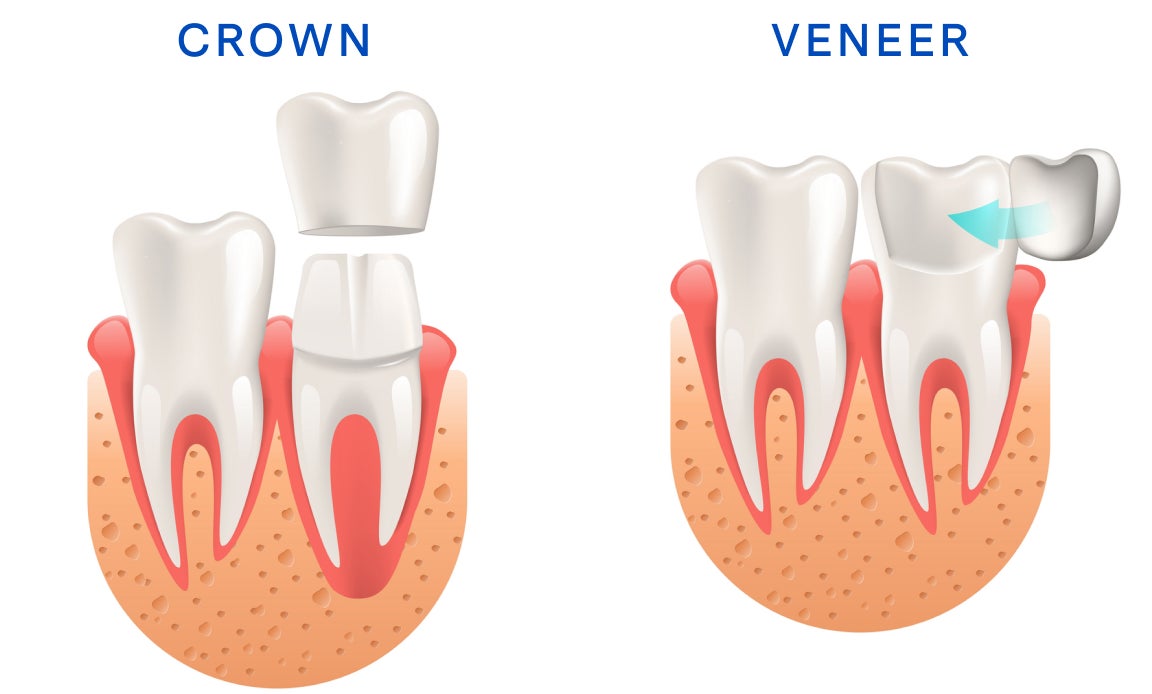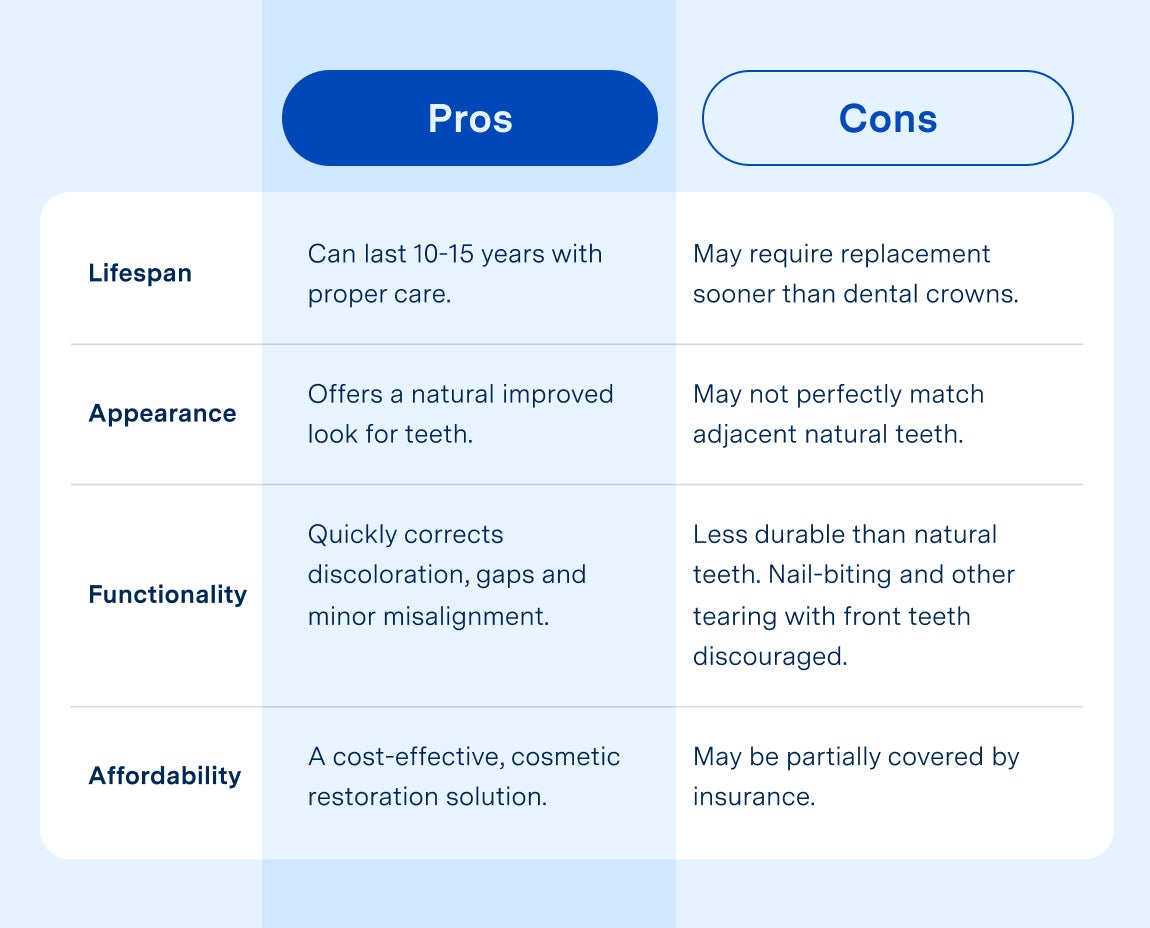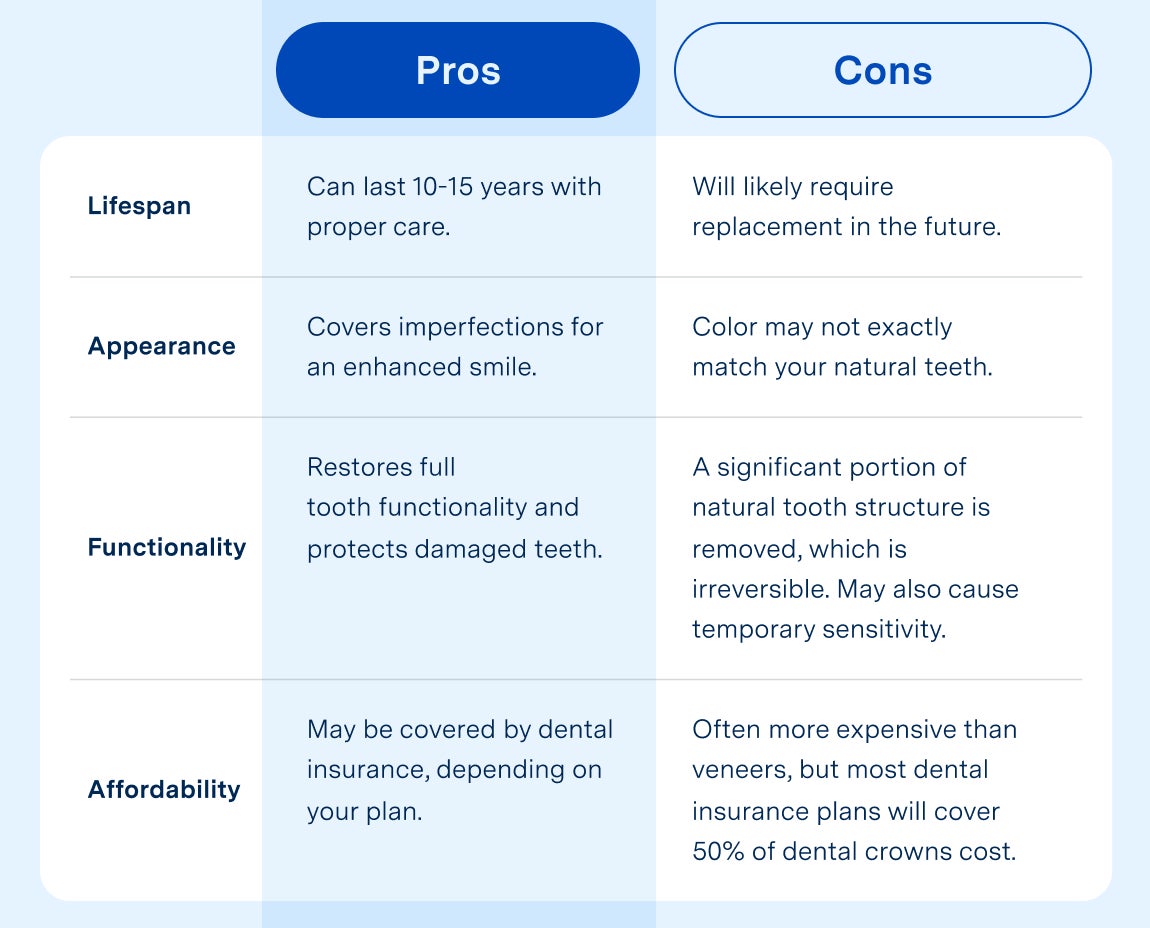Veneers vs. crowns: What's the difference?
Explore the differences between veneers and crowns to determine which best suits your smile restoration needs.

Wondering about the difference between veneers and dental crowns? Both improve the look of your teeth but impact the function slightly differently. No matter which option is right for you, your Aspen Dental care team can help.
The difference between veneers and crowns
Both veneers and dental crowns are great solutions for reclaiming your smile. Let’s walk through some of the key steps during each procedure.

The process: Dental veneers vs crowns
Whether you’re getting veneers or crowns, the treatment process is similar. Let’s explore the next steps toward transforming your smile.
Tooth prep
Your dentist will start by removing a thin layer of enamel.
Scan
Next, it's time to take a scan of your tooth.
Temporary veneers or crowns
Temporary veneers or crowns are placed to keep your smile strong. These are made in-house at our Aspen Dental labs.
Custom veneer or crown creation
We’ll custom craft your veneers or crowns for you.
Final adjustments
It’s time for your final bite and fit check.
Placement
Once they are ready, your dentist will securely attach your veneers or crowns. Enjoy your new smile!
Veneers vs. crowns pros and cons
Is one better than the other? The choice comes down to your own oral health needs. Talk with your Aspen Dental dentist about your best option and compare the pros and cons of each.
Lifespan
Dental veneers can last 10-15 years with proper care, providing a long-term aesthetic solution, but they are not permanent and will eventually require replacement, leading to future costs and procedures.
Appearance
Veneers offer an improved look for teeth, enhancing one's smile and overall facial aesthetics; however, if not properly matched or applied, they can sometimes appear artificial or out of place compared to natural teeth.
Functionality
Veneers quickly correct discoloration, gaps, and minor misalignment, addressing multiple dental issues simultaneously. However, they are less durable than natural teeth, making them more susceptible to chipping, cracking, or staining over time. Additionally, the application process often requires removing a small amount of natural tooth enamel, which is irreversible.
Affordability
Veneers are generally considered a cost-effective cosmetic restoration solution compared to more invasive dental procedures. While the initial investment can be significant, some dental insurance plans may partially cover the cost, especially if the veneers are deemed medically necessary rather than purely cosmetic. However, coverage varies widely between insurance providers and plans, so patients should check with their insurance company to understand potential out-of-pocket expenses.

What are the pros and cons of dental veneers?
Electric toothbrushes offer consistent and efficient brushing motions, removing more bacteria and plaque compared to manual brushes. These features ensure that all your teeth receive equal attention during cleaning, boosting your oral health.
Electric toothbrushes are suitable for everyone, including kids, seniors and individuals with disabilities. They are particularly helpful for those who struggle with manual brushing. Some even come with built-in timers, making it easy to brush for the recommended two minutes.
Lifespan
Dental crowns are highly durable and can last 10-15 years or even longer with proper care. However, they are not indestructible and may need replacement due to wear, damage, or decay of the underlying tooth structure over time.
Appearance
While primarily designed to restore tooth function, dental crowns may also address some aesthetic concerns. They effectively cover chips, cracks, discoloration, and other visual imperfections. While the main goal of a crown is to improve the health and functionality of a tooth, it can simultaneously enhance its appearance. However, achieving a perfect match can sometimes be challenging, especially for front teeth. The appearance benefit is often considered a secondary, yet significant, advantage of this primarily restorative procedure.
Functionality
Dental crowns effectively restore the shape, size, and strength of damaged teeth, improving both chewing ability and speech. They can protect weak teeth from further decay and hold together parts of cracked teeth. On the downside, the process requires removing a significant amount of the original tooth structure, which is irreversible. Some patients may also experience increased sensitivity to hot and cold initially.
Affordability
While dental crowns can be more expensive than some other dental procedures, they often provide a long-term, cost-effective solution for severely damaged teeth. Many dental insurance plans partially cover the cost of crowns, especially when they are deemed medically necessary rather than purely cosmetic. However, out-of-pocket expenses can still be significant, and coverage varies widely between insurance providers and plans.

What are the pros and cons of dental crowns?
However, electric toothbrushes may not be suitable for everyone. They can be pricier than manual brushes and require replacement brush heads or batteries. In some cases, they may cause discomfort or sensitivity for individuals with sensitive teeth or gums. It's always best to consult with your dentist or dental hygienist to determine which type of toothbrush is most suitable for your specific needs.
Veneers vs. crowns FAQs
Is one treatment more effective than the other?
Veneers are great for improving the look of front teeth, while crowns offer more extensive protection and restoration for damaged teeth. Both will enhance the look of your smile.
How long is the dental crown recovery period compared to dental veneers?
Both procedures, dental crowns and veneers, may experience sensitivity in the day(s) following.
How much do veneers cost compared to crowns?
The cost of veneers and crowns varies based on your office location and the materials used.
How long do veneers last vs. crowns?
Veneers typically last 10-15 years, while crowns tend to last 15-20 years before needing replacement. Durability varies based on oral care and habits—so be good to your teeth!

Explore veneers and crown solutions for you
Take the first step to completing your smile. Contact your local Aspen Dental to see if veneers or crowns are right for you.
Schedule appointment >
